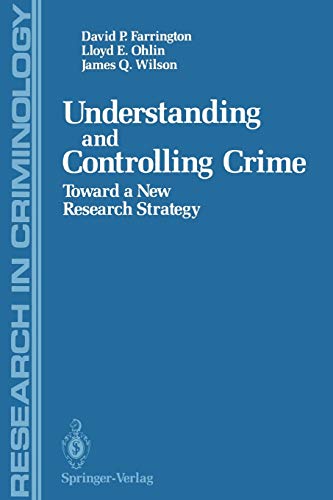Verwandte Artikel zu Understanding and Controlling Crime: Toward a New Research...
Understanding and Controlling Crime: Toward a New Research Strategy (Research in Criminology) - Softcover

Inhaltsangabe
In 1982 the John D. and Catherine T. MacArthur Foundation created a small committee-the Justice Program Study Group (whose membership is listed at the end ofthis preface)-and posed to it what can hardly be regarded as an easy ques tion: "What ideas, what concepts, what basic intellectual frameworks are lack ing" to understand and to more effectively deal with crime in our society? Those who are acquainted with the work of the members of the Study Group will appreciate how many divergent views were expressed-divergent to the degree that some of us came to the conclusion that we were not a Study Group at all but rather a group being studied, an odd collection of ancient experimental animals serving some dark purpose of the Foundation. Eventually, however, a surprisingly strong concurrence emerged. We found we were impressed by the extent to which in our discussions we placed heavy reliance on the products of two types of research: first, those few longitudinal studies related to juvenile delinquency and crime that had been pursued in this country and, second, a few experimental studies that had sought to measure the consequences of different official interventions in criminal careers. These two research strategies had taught us much about crime and its control. Other strategies-case studies, cross-sectional surveys, participant observations, and similar techniques-had indeed been productive, but it was the longitudinal and experimental designs that firmed up the knowledge that the others helped to discover.
Die Inhaltsangabe kann sich auf eine andere Ausgabe dieses Titels beziehen.
Reseña del editor
In 1982 the John D. and Catherine T. MacArthur Foundation created a small committee-the Justice Program Study Group (whose membership is listed at the end ofthis preface)-and posed to it what can hardly be regarded as an easy ques tion: "What ideas, what concepts, what basic intellectual frameworks are lack ing" to understand and to more effectively deal with crime in our society? Those who are acquainted with the work of the members of the Study Group will appreciate how many divergent views were expressed-divergent to the degree that some of us came to the conclusion that we were not a Study Group at all but rather a group being studied, an odd collection of ancient experimental animals serving some dark purpose of the Foundation. Eventually, however, a surprisingly strong concurrence emerged. We found we were impressed by the extent to which in our discussions we placed heavy reliance on the products of two types of research: first, those few longitudinal studies related to juvenile delinquency and crime that had been pursued in this country and, second, a few experimental studies that had sought to measure the consequences of different official interventions in criminal careers. These two research strategies had taught us much about crime and its control. Other strategies-case studies, cross-sectional surveys, participant observations, and similar techniques-had indeed been productive, but it was the longitudinal and experimental designs that firmed up the knowledge that the others helped to discover.
Reseña del editor
A Report Comm. by the Justice Program Study Group of the John D. and Catherine T. MacArthur Foundation
„Über diesen Titel“ kann sich auf eine andere Ausgabe dieses Titels beziehen.
Neu kaufen
Diesen Artikel anzeigenGratis für den Versand innerhalb von/der Deutschland
Versandziele, Kosten & DauerSuchergebnisse für Understanding and Controlling Crime: Toward a New Research...
Understanding and Controlling Crime : Toward a New Research Strategy
Anbieter: AHA-BUCH GmbH, Einbeck, Deutschland
Taschenbuch. Zustand: Neu. Druck auf Anfrage Neuware - Printed after ordering - In 1982 the John D. and Catherine T. MacArthur Foundation created a small committee-the Justice Program Study Group (whose membership is listed at the end ofthis preface)-and posed to it what can hardly be regarded as an easy ques tion: 'What ideas, what concepts, what basic intellectual frameworks are lack ing' to understand and to more effectively deal with crime in our society Those who are acquainted with the work of the members of the Study Group will appreciate how many divergent views were expressed-divergent to the degree that some of us came to the conclusion that we were not a Study Group at all but rather a group being studied, an odd collection of ancient experimental animals serving some dark purpose of the Foundation. Eventually, however, a surprisingly strong concurrence emerged. We found we were impressed by the extent to which in our discussions we placed heavy reliance on the products of two types of research: first, those few longitudinal studies related to juvenile delinquency and crime that had been pursued in this country and, second, a few experimental studies that had sought to measure the consequences of different official interventions in criminal careers. These two research strategies had taught us much about crime and its control. Other strategies-case studies, cross-sectional surveys, participant observations, and similar techniques-had indeed been productive, but it was the longitudinal and experimental designs that firmed up the knowledge that the others helped to discover. Artikel-Nr. 9781461293675
Anzahl: 1 verfügbar
Understanding and Controlling Crime: Toward a New Research Strategy (Research in Criminology)
Anbieter: Ria Christie Collections, Uxbridge, Vereinigtes Königreich
Zustand: New. In. Artikel-Nr. ria9781461293675_new
Anzahl: Mehr als 20 verfügbar
Understanding and Controlling Crime: Toward a New Research Strategy (Research in Criminology)
Anbieter: Revaluation Books, Exeter, Vereinigtes Königreich
Paperback. Zustand: Brand New. reprint edition. 211 pages. 9.25x6.10x0.60 inches. In Stock. Artikel-Nr. x-1461293677
Anzahl: 2 verfügbar

